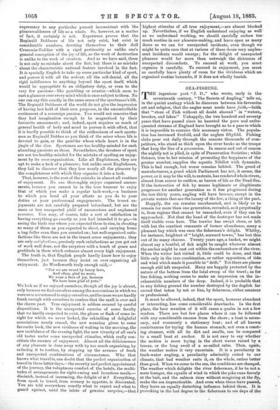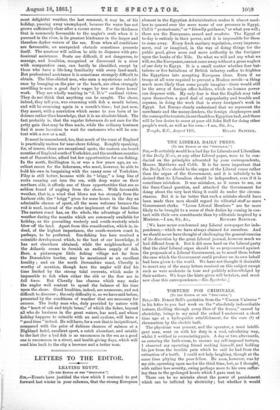SEA-FISHING.
THE ingenious poet "J. D.," who wrote, early in thee- seventeenth century, "The Secrets of Angling," tells us,: in the quaint analogy which he disCovers between his .favourite art and religion, that the angler must needs have faith,—faith. that "store of Fish without all doubt abound" in " waters„- brookes, and lakes." Unhappily, the two hundred and seventy years that have passed since he haunted the pure and unfre- quented streams of England have brought us to a pass in which it is impossible to exercise this necessary virtue. The popula- tion has increased fivefold, and the anglers fiftyfold. Fishing clubs pour out daily through the seasons thousands of com- petitors, who stand as thick upon the river banks as the troops. that keep the line of a procession. In season and out of season the nightly net is plied, in spite of Preservation Societies ; while Science, true to her mission of promoting the happiness of the greater number, supplies the aquatic Nihilist with dynamite.. This is bad enough, but worse remains behind. The greed of manufacturers, a greed which Parliament has not, it seems, the power, or it may be the will, to restrain, has rendered whole rivers,. almost from source to outflow, as barren of life as the Dead Sea.. If the destruction of fish by means legitimate or illegitimate progresses for another generation as it has progressed during the last thirty years, angling will have become, except in the private waters that are the luxury of the few, a thing of the past..
Happily, the sea remains unexhausted, and is likely so to. remain for more than one generation, recruited, as it perpetually is, from regions that cannot be ransacked, even if they can be- approached. Not that the hand of the destroyer has not made itself visible even here. •The trawler has swept clean, or left with but the scantiest remnants of former abundance, many a pleasant bay. which was once the fisherman's delight. Whitby, for instance, brightest of " bright, seaward towns," has lost this. out of its many charms. Twenty years ago, a basket, we might: almost say a boatful, of fish might be caught wherever almost. the anchor might be cast out within the embouchure of the river. When the writer last visited it, little could be done, and that little only in the rare combination, or rather opposition, of tide and wind which made it possible to " drift." Yet there are places> enough still left unspoiled. Many are happily protected by the nature of the bottom from the fatal sweep of the trawl; as for line fishing, nothing seems to make an impression on the in- exhaustible numbers of the deep. Indeed, it is probable that in any fishing ground the number destroyed by the dogfish far exceed that taken by net or line, by fishermen, either, amateur- or professional.
It most be allowed, indeed, that the sport, however abundant or interesting, has some considerable drawbacks. In the first place, the bare mention of it will cause a qualm in not a few readers. There are but few places where it can be followed with any considerable success from the shore ; a boat is neces- sary, and commonly a stationary boat ; and of all known. contrivances for trying the human stomach, not even a coast-• ing steamer, with all its dirt and smells, can be compared to a small boat at anchor. It is not easy to say whether the motion is more trying in the short waves raised by a breeze, or the long swell of a so-called calm. Then, again, the weather makes it very uncertain. It is a peculiarity in• fresh-water angling, a peculiarity admirably suited to our climate, that bad weather snits it, on the whole, rather better than good. When we come to the sea, the conditions are changed.. The weather which delights the river fisherman, if he be not a mere lounger, the squalls of wind in which the pike runs fiercely at the bait, and the salmon rises without misgiving at the fly, make the sea impracticable. And even when these have passed, they leave an equally disturbing influence behind them. It is provoking in the last degree to the fisherman to see days of the most delightful weather, the last remnant, it may be, of his holiday, passing away unemployed, because the water has not grown sufficiently clear after a recent storm. For the thickness that is commonly favourable to the angler's craft when it is pursued in the river, is its greatest hindrance in the deeper and therefore darker waters of the sea. Even when all conditions are favourable, an unexpected obstacle sometimes presents itself. The amateur will seldom be able to dispense with pro- fessional assistance. Boats are difficult, if not dangerous, to manage, and localities, recognised or discovered in a river with comparative ease, can hardly be identified, except by those who have a life-long familiarity with every land-mark. But professional assistance it is sometimes strangely difficult to obtain. The blue-shirted men, who earn a mysterious subsist- ence by lounging on the pier or the beach, are often strangely unwilling to earn a good day's wages by two or three hours' work. They are wholly wanting in "J. D.'s " cardinal virtue. They do not think that anything can be caught. The shore, indeed, they tell you, was swarming with fish a month before, and will be swarming again in a month's time; but just now, they assert, with a conviction which seems to you born of in- dolence rather than knowledge, that it is an absolute blank. The fact probably is, that the regular fishermen do not care for the petty gain that may be thus made, while the ordinary boatmen find it more lucrative to wait for customers who will be con- tent with a row or a sail.
It must be remembered, too, that much of the coast of England is practically useless for near-shore fishing. Roughly speaking, for, of course, there are exceptional spots, the eastern sea-board counties of England south of Yorkshire, and the southern counties east of Dorsetshire, afford but few opportunities for sea-fishing. In the north, Bridlington is, or was a few years ago, an ex- cellent resort for the fisherman, who must, however, be able to hold his own in bargaining with the canny sons of Yorkshire. Pfley is still better, because with its " brigg," a long line of rocks running out into the sea, with deep water on their northern side, it affords one of those opportunities that are so seldom found of angling from the shore. With favourable weather, that is, a wind that blows not too strongly from the harbour side, the " brigg " gives for some hours in the day an admirable chance of sport, all the more welcome because the rod is used, instead of the ruder implement of the hand-line. The eastern coast has, on the whole, the advantage of better 'weather during the months which are commonly available for holiday, as the prevailing westerly and south-westerly winds blow off the land. Apart from this consideration, which is, in- deed, of the highest importance, the south-western coast is, perhaps, to be preferred. Sea-fishing has here received a scientific development which, to the best of our knowledge, it has not elsewhere obtained, while the neighbourhood of the Atlantic seems to furnish an endless supply of fish. Beer, a picturesque little fishing village not far from the Dorsetshire border, may be mentioned as an excellent locality ; and on the north Devonshire coast, Clovelly is worthy of mention, though here the angler will find his time limited by the strong tidal currents, which make it impossible to fish when either the ebb or the flow are in full force. But Clovelly has charms which may make the angler well content to spend the balance of his time upon -the shore. Good localities, indeed, are numerous, and not difficult to discover ; the only difficulty is, as we have said before, presented by the conditions of weather that are necessary for success. The lucky man who, duly provided by nature with the "heart of oak and triple brass," of which the fisher, beyond all who do business in the great waters, has need, and whose holiday happens to coincide with an anticyclone, will have a " good time " indeed. He will have, for a cost that is insignificant, compared with the price of dubious chances of salmon at a Highland hotel, excellent sport, a catch abundant, and eatable to the last (for a bad fish is as uncommon in the sea as a good one is uncommon in a river), and health-giving days, which will send him back to the city a browner and a better man.



































 Previous page
Previous page